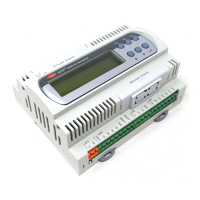Modular Standard HP Chiller for Carel driver
Carel code +030221236- Rel. 1.0 dated 7 July 2003
39
17.2.2 ADVANCED LOG
Events are logged on the 1MB or 2MB memory expansion module, which is a permanent appendix to the board. Advantages and features are
listed below:
• Event-based log: a typical event-based log is the alarm log. When an alarm occurs, the alarm generated is stored along with significant
data (temperatures, pressures, set points etc.).
• Time-based log: a typical event[sic! probably time]-based log is the temperatures/pressure log. Temperature and pressure values are
stored at regular intervals.
• Log log: this is the log of the last alarms/temperatures/pressures stored before a serious alarm. Unlike data stored in the event- and
time-based logs, these data are not overwritten when the memory is full.
• You have the option of choosing the values to be saved at any time as well as the method used to save them. Using the “WinLOAD”
utility program, you can define the values to be saved and the method used to save them with the aid of a practical Wizard. WinLOAD
does not need application software files as it can procure all the information required directly from the pCO1 – pCO2 board’s resident
application software.
• 1MB of dedicated FLASH memory. With this system, data are saved to the 1MB FLASH memory included in the memory expansion
module (code PCO200MEM0). By way of example, 1MB of memory can hold 5,000 alarm events with 5 values for each alarm, and 6
months of recording 2 values - for instance, temperature and pressure - saved every 5 minutes.
• Option of defining up to 7 different log configurations. Usually, each controller will have one alarm log and one log for control values
(temperature/humidity/pressure) configured, in addition to a number of “log logs”.
• Stored data can be consulted either via the (separate or built-in) LCD terminal or via a connected PC.
• “Black box” operating mode. The memory expansion module containing the logs can be removed from the controlled unit’s pCO² and
inserted in another pCO², via which the stored data can be consulted. The host pCO² does not need to contain the same software as the
original.
• Stored data reliability. Data are saved to a FLASH memory that does not need batteries, which are liable to run down. If previously
stored data are not compatible with new software following an upgrade, all data are erased (you are prompted to confirm first).

